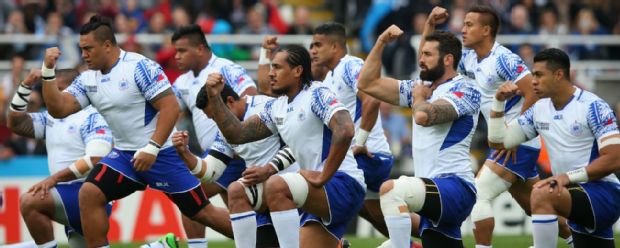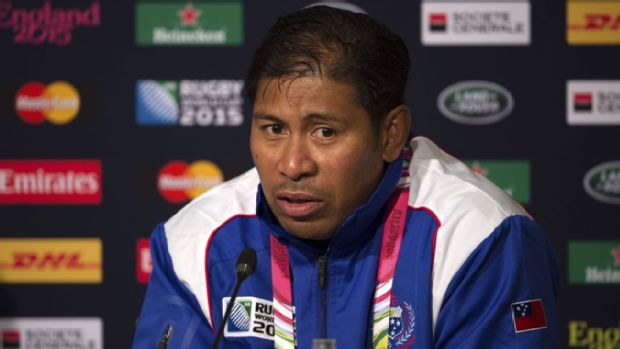|
Samoa
The impossible job? The issues Alama Ieremia must address if Samoa are to succeed
Dan Leo
January 4, 2016
 © (Photo by Alex Livesey/Getty Images) Rugby runs through people's veins in the Pacific. Since missionaries first introduced the concept in the late 1800s, the game exploded in popularity and Polynesians in particular became obsessed with rugby as a pastime. Not just on the biggest islands of Tonga, Samoa or Fiji either; look through World Rugby's 100 top-seeded nations and you will see the likes of the Cook Islands, American Samoa, the Solomon's, Vanuatu, even Niue -- with its population of under 2,000 -- are present. But funding international rugby programmes comes at huge expense to our tiny and impoverished island economies. Often it is public services, hospitals and schools who bear the brunt of that cost. In this respect entire islands are affected, the highs of success and troughs of failure ridden by all. After what was a woeful Rugby World Cup display by the top three Pacific Island teams, it comes as no surprise then that just over a little two months on people are still hurting. With only Fiji coming out of it with any credibility, the aftermath has been expectedly harsh, with Samoa and Tonga head coaches Stephen Betham and Mana Otai losing their jobs. As Stuart Lancaster will attest, coaching is a thankless task. Given the riches of professional talent at Samoa and Tonga's disposal though, the string of poor results means the dismissals are probably justified. In Samoa the ache of World Cup failure subsided for a moment with the announcement of Betham's dismissal and news the Samoan Rugby Union were to scour the globe for the best possible replacement. No expense would be spared, the public were promised. It was later disclosed that an independent panel, headed by former All Black Captain Graham Mourie, would handle the selection process at the insistence of World Rugby. In a country where the sport has been decimated by political interference this was music to every Samoan's ear: a glimmer of hope after years of frustration. As the weeks rolled by, the pain eased further and speculation built about who would be tasked with restoring pride into the beloved royal blue jersey. Robbie Deans? Aussie McLean? Or Ewen McKenzie, perhaps? After all the disappointment of late, Samoans around the world dared to dream once more.
With so much pointing in the right direction it was somewhat of an anti-climax then when Samoa's assistant coach Alama Ieremia was confirmed as Betham's replacement. Rather than the dawn of a new era as many had hoped, it appeared Mourie and Co. decided continuity was more important at this time than wiping the slate clean. Understandably, a large number of Manu Samoa fans have been left dissatisfied. But while I agree Ieremia is somewhat responsible for the Samoa's RWC2015 debacle, I disagree with those who say that he is the wrong man for the job. While Ieremia may not have the experience or ability of some of those previously mentioned, Pacific Island rugby is complex. If icebergs existed here, then coaching rugby would be the mere tip of his role. Not just any one can make it work. Monitoring players across worldwide competitions requires intensive travelling and months overseas. Accessing and integrating players from different systems with limited time and on shoestring budgets can be equally difficult. Throw in the complications of dealing with a domineering and eccentric Prime Minister in what is a markedly hierarchal culture and you begin to realise that coaching Samoa requires much more than a big reputation and good rugby brain. The position demands the right character and pedigree. Ieremia possesses both of those in spades. As an ex-All Black the playing group look up to him which in spite of recent events -- namely last year's player revolt -- is a good start. His approachable demeanour compliments the aura that shrouds anyone who has pulled on the famous black jersey. It has enabled him to win the player's support during what have been tumultuous times. Namulauulu, his chiefly 'matai' title, ensures Ieremia is well respected and influential in a cultural context too. This goes a long way in dealing with the political battles that inevitably arise with the job. I also believe Ieremia's time as assistant coach will serve him well. He has spent those hours on the road in Europe, those months away from family. He is aware of the challenges and sacrifices required. Ultimately coaches are judged on their results. No one expects Ieremia to win the World Cup, but Samoa's current ranking of 15th is an embarrassment that needs correcting. So can Ieremia lead Samoa back from rugby's wilderness and back into the top ten?  © AFP/Getty Images In my opinion RWC2015 revealed two key deficiencies in the way we Pacific Islanders approach our rugby. Ieremia will have to address both if he is to reverse Samoa's fortunes. Firstly, we have an over reliance on our natural ability, size and strength. Whilst the combination of these 'uncoachables' may have been enough in the past, this time round the likes of Japan and Georgia easily counteracted them with superior technique, structure and conditioning. Here in Europe we see burly islanders drafted in by the dozen for the x-factor quality and power games they possess. Clubs don't require endurance, discipline or even a full 80 minutes out of these men so long as the individual moments of brilliance, those game changing off-loads or line-bursting breaks keep coming. Clubs have confidence in their ample supply of less gifted but higher conditioned, technically expert players who can cover for the odd mistake or the odd moment of laziness their star Samoan or Tongan 'impact' player may have. Throw 15 impact players into one side though and you have a problem. At RWC2015 both Tonga and Samoa got the balance of their squads wrong. They lacked workhorses. Those types of players who go largely unseen but whose work ethic and low error rates are invaluable: men who are happy to just hit rucks and graft all day. All of the top sides have their ball players and ball winners. Tonga and Samoa had riches of carriers but too few set-piece specialists. Distributors and players with world-class tactical nous were also amiss. Without good quality ball and field position, our impact players were made redundant. Ieremia's first task with Samoa will be to identify players with such skill sets and instil basic fundamentals and higher conditioning levels within the others; those basics that our professionals in Europe have been allowed to neglect. The second issue that needs rectifying is the fact Pacific sides don't play enough games against tier one competition. Argentina is the obvious example here and they need to be our template. Until recently, the only thing world class about the Pumas was their scrum, Samoa used to beat them consistently. But it's hard to imagine us even getting close to them today. Argentina didn't become a top five side by beating the USA, Canada and Romania week in week out, they improved through their involvement in the Rugby Championship. Yes, there were some thrashings along the way, but eventually it happened. This may be slightly above his line of duty, but with Ieremia's reputation on the line he should be using every ounce of his influence to push for a higher calibre of opposition than Samoa is currently exposed to in the Pacific Nations Cup. With a fanatical population following his every move, I do not envy Ieremia or his task ahead. But if he can address these two key areas, I see no reason that Samoa cannot scale the heights we did between 2010 and 2012. Good luck, Al. © ESPN Sports Media Ltd.
|
Live Sports
Communication error please reload the page.
-
Football
-
Cricket
-
Rugby
-
- Days
- Hrs
- Mins
- Secs
F1 - Abu Dhabi GP
Abu Dhabi Grand Prix December 11-131. Max Verstappen ()
2. Valtteri Bottas (Mercedes)
3. Lewis Hamilton (Mercedes)
4. Alexander Albon ()
5. Lando Norris ()
6. Carlos Sainz Jr ()
-
ESPNOtherLive >>
Golf - Houston Open
Snooker - China Open
Tennis - Miami Open

